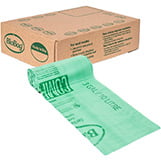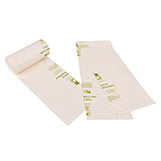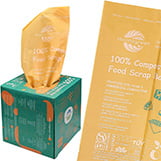- Best Kitchen Garbage Bags | SUPERBIO | Find on Amazon
- Best For Compost Bins | BioBag | Find on Amazon
- Best Lawn And Leaf Trash Bags | Public Goods | Find on Public Goods
Are you tired of using traditional plastic garbage bags that take hundreds of years to decompose and contribute to the accumulation of non-biodegradable waste in the environment? Do you want to impact the planet and reduce your carbon footprint positively? Look no further than biodegradable trash bags!
These eco-friendly trash bags are made from plant-based materials and will break down naturally in a landfill, making them the perfect solution for environmentally conscious consumers who want to reduce their impact on the planet. They are a sustainable choice and feature sturdy construction and easy-to-use design, so you can still enjoy the convenience you need to manage your household waste.
Below, we're breaking down everything about biodegradable, earth-friendly trash bags, their pros and cons, how they differ from conventional garbage, and what to look for in a product. Then, we'll highlight a few of the best biodegradable trash bags.
What Are Biodegradable Trash Bags?
As the name implies, a biodegradable trash bag is specifically engineered to decompose naturally in a landfill setting. The bottom line is compostable or biodegradable trash bags are more environmentally friendly than bags made from virgin or recycled plastics. While conventional waste bags are made from petrochemicals, these biodegradable plastic alternatives use plant-based materials that degrade over time in recycling facilities, landfills, and composting facilities.
What Are Biodegradable Trash Bags Made Out Of?
Instead of plastic, these waste bags are made from a plant-based material that is better for the environment. The components of biodegradable trash bags vary from product to product; the majority include plant starches, vegetable oils, semi-synthetic chemicals, and plant-based polymers.
Pros and Cons of Biodegradable Trash Bags
Switching from a plastic bag to a compostable and biodegradable trash bag is an easy way to increase your sustainability efforts and help create a healthier planet.
pros of Using Biodegradable bags
Better for the Environment— Swapping from plastic trash bags to compostable or biodegradable bags is an easy way to reduce your carbon footprint. Many brands produce their bags using renewable energy and use recycled materials in their packaging.
Reduces Plastic Usage— Both virgin and recycled plastic bags release microplastics as they break down. These tiny plastics are a major source of pollution in marine environments and are hazardous to fish and animals that consume them.
Cons Of using biodegradable bags
Leaking— Because the biodegradable bags are designed to break down in a landfill, they sometimes disintegrate and leak if left sitting in water or liquid for too long. This happens most frequently with the food scraps in your kitchen compost pile, as the moisture and heat in composting conditions can speed up the decomposition process.
Price— The downside of using sustainable production methods and substances is that compostable bags are slightly more expensive than traditional kitchen waste bags. That said, the majority of biodegradable trash bags available on the market remain reasonably priced.
Avoid Greenwashing Products— To make their plastic trash bags appear better for the environment than the product really is, many manufacturers will utilize greenwashing marketing tactics and describe a product as a bioplastic trash bag, biobag, biodegradable plastic garbage bag, or another misleading term that deceives consumers.
Biodegradable trash bags vs. Compostable Trash Bags
Though often used interchangeably, compostable and biodegradable don't mean the same thing. Unfortunately, the two terms can be confusing for consumers, so let's quickly examine the differences between the two.
Biodegradable trash bags are designed to break down into smaller pieces over time, but the process can take several years or even decades, depending on the environment. Biodegradable trash bags are often made from plant-based materials and can decompose through natural processes such as sunlight, heat, and oxygen.
In contrast, compostable trash bags are created to decompose at a much faster rate than biodegradable bags. Compostable trash bags are made from materials that can be broken down into organic matter through composting, a controlled process involving specific temperature and humidity levels, as well as microbes and other organisms that break down the material into compost. Compostable trash bags are certified to meet specific standards, such as ASTM D6400 or EN 13432, and can break down in as little as 90 days in a composting environment.
What To Look For In Biodegradable Trash Bags
With a growing number of environmentally-friendly bags on the shelves, you'll want to key an eye out for the following things when choosing between brands and products:
Size and fit
First things first, you'll want to double-check that the biodegradable trash bags you're purchasing are the correct size for your bin. The average kitchen trash can fits 13-gallon tall kitchen trash bags, smaller bathroom trash cans hold around 2 to 4 gallons, and home compost bins are between 1 to 2 gallons.
Bag Style
In addition to size, you'll also need to choose between drawstrings, handles, or tie-closure bags.
Strength and durability
Check the weight capacity of the trash bags to make sure they can hold the amount of trash you typically generate. If you need extra strength, look for bags with reinforced seams or double-layered material.
Thickness
While biodegradable bags are designed to break down over time, they shouldn't fall apart in your garbage bin. Look for garbage bags made from thick, durable materials to help prevent tears, leaks, and annoying messes.
Price
It's easy to assume that all eco-friendly products come at a slightly higher cost, but numerous affordable biodegradable and compostable trash bags are on the market. With that being said, it may be worth spending an extra dollar or two on a pack to ensure they're made with high-quality materials that won't leak or tear.
Biodegradability
Make sure the bags are certified as biodegradable and compostable. Look for certifications such as ASTM D6400 or EN 13432, which indicate that the bags will break down into natural components in a composting environment.
Certifications
Many companies use greenwashing marketing schemes to make their products seem more eco-friendly than they actually are, so you should always look for credible certifications (such as BPI) to back up these claims.
The Best Biodegradable Trash Bags
BioBag The Original Compostable Bag
Best Overall
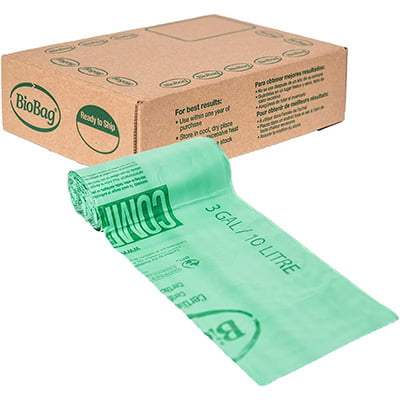
Source: Amazon
For those dedicated to reducing their environmental footprint, BioBag Compostable Bags are a must-try. These bags are crafted from plant-based materials, making them a sustainable alternative to traditional trash bags. They are certified to meet ASTM D6400 standards for compostability, which means they break down into natural components that can be used as nutrient-rich soil.
Their durability sets these compostable trash bags apart from other biodegradable options. BioBag Compostable Bags are not only environmentally friendly but also reliable, capable of carrying heavy loads. The reinforced seams also provide an extra layer of protection against leaks and spills. Plus, the breathable material reduces moisture and odors, keeping your garbage can fresh and clean.
But the best part? By choosing BioBag Compostable Bags, you're making a conscious decision to opt for a sustainable alternative to traditional plastic bags that have a harmful impact on the environment. They are made from renewable resources and leave no harmful residues behind when decomposed. Plus, these compostable bags don't emit harmful chemicals as they degrade.
Our Ratings
Overall Rating: 4.8/5 Durability: 4.8/5 Sturdiness: 4.4/5 Ease of Use: 4.4/5 Scent: 0/5 Leak Proof: 4/5
Materials | Starches of plants |
Capacity | 3 Gallons |
Pros:
Cons:
Earth's Natural Alternative
Most Budget-Friendly Choice
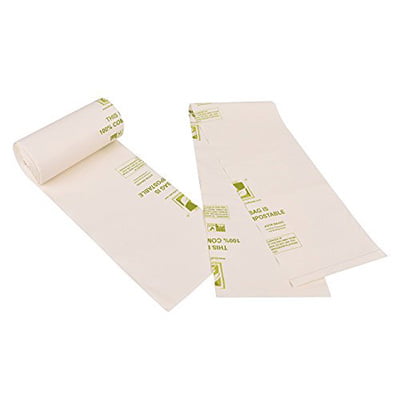
Source: Walmart
Earth's Natural Alternative Compostable Kitchen Trash Bags is the perfect solution for anyone looking for a sustainable and eco-friendly way to manage their household waste. In addition to being eco-friendly, BioBag Compostable Bags are practical, dependable, and reasonably priced. They present an excellent alternative to traditional plastic bags, which are detrimental to the environment and can take hundreds of years to decompose.
Made from sustainable and renewable vegetable starch like non-GMO cornstarch, these bags are fully compostable and meet ASTM D6400 standards. This means that these bags will fully decompose in a composting environment within 180 days, leaving behind no harmful residues. Earth's Natural Alternative Compostable Kitchen Trash Bags are BPI-certified, dye-free, and BPA-free, unlike other trash bags.
What impressed us the most about these bags was their exceptional strength and durability. The compostable trash bag is extra thick, measuring one mil, making it sturdy enough to handle your household waste easily.
Our Ratings
Overall Rating: 4.6/5 Durability: 4.5/5 Sturdiness: 4.5/5 Ease of Use: 4.7/5 Scent: 0/5 Leak Proof: 4.4/5
Materials | non-GMO cornstarch |
Capacity | 13 Gallons |
Pros:
Cons:
UNNI Compostable Kitchen Trash Bags
Best Thick Biodegradable and compostable bags
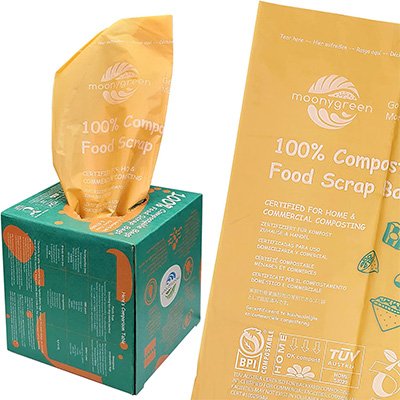
Source: Amazon
The UNNI Compostable Kitchen Bags offer a sustainable and eco-friendly solution to your household waste management. These compostable and biodegradable bags are strong, durable, and compostable, making them a great choice for anyone who wants to positively impact the environment.
These biodegradable garbage bags are made from plant starches and are certified to meet both ASTM D6400 and EN 13432 standards for compostability, which means they break down into natural components in a composting environment without leaving any plastic or micro-plastic. You can even compost this compostable trash bag in your own backyard.
One of the things that stood out to us about these compostable bags is their strength and durability. With a thickness of 0.87 mils, these compostable bags are strong enough for your household. They held up well to heavy loads of kitchen waste and other household trash, and the reinforced seams prevented any leaks or tears. You'll appreciate the versatility of UNNI Compostable Kitchen Bags, as they are available in various sizes to fit any trash can, making it effortless to find the perfect fit.
Our Ratings
Overall Rating: 4.5/5 Durability: 4.4/5 Sturdiness: 4.5/5 Ease of Use: 4.8/5 Scent: 0/5 Leak Proof: 4.4/5
Materials | vegetable |
Capacity | 3 Gallons |
Pros:
Cons:
SUPERBIO 13 Gallon Compostable Handle Tie Tall Kitchen Garbage Bags
Best Kitchen Garbage Bags
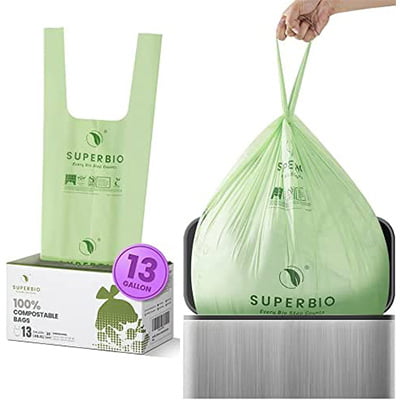
Source: Amazon
Are you searching for an easy and environmentally-conscious method to manage your household waste? The Superbio compostable garbage bags are a great solution combining sustainability and convenience.
These biodegradable and compostable bags are made from plant-based, compostable materials. Superbio compostable garbage bags have been certified compostable by the Biodegradable Products Institute, meeting the rigorous standards set by ASTM D6400. This means that they will break down completely in a composting environment within 180 days in composting conditions.
The Superbio compostable garbage bags come in a roll of 30 bags, making it easy to grab a new bag whenever you need it. The bags are also tear-resistant and have reinforced seams that prevent leaks and spills, making them a reliable and convenient choice for daily waste disposal. Unlike many other biodegradable trash bags, Superbio compostable trash bags come with a handle tie that makes lifting and tying a breeze. Not only are these bags practical, but they are also environmentally friendly. They are made from renewable resources and are free from harmful chemicals, making them safe for both people and the environment.
Our Ratings
Overall Rating: 4.6/5 Durability: 4.5/5 Sturdiness: 4.5/5 Ease of Use: 4.7/5 Scent: 0/5 Leak Proof: 4.4/5
Materials | Plant-based |
Capacity | 13 Gallons |
Pros:
Cons:
BioBag Compostable Food Trash Bags
Best For Compost Bins
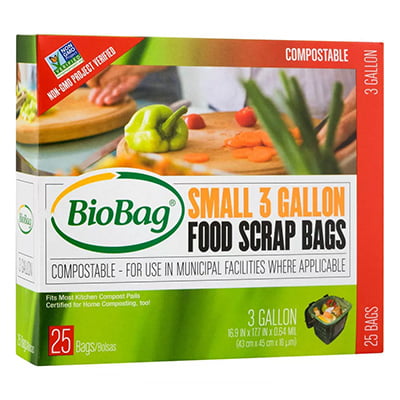
Source: Target
The BioBag Compostable Food and Trash Bags is the perfect eco-friendly solution to your household waste management! These small 3-gallon bags are the ideal size for collecting food scraps and other organic waste in your kitchen, helping you to reduce your carbon footprint and contribute to a more sustainable planet.
Made from plant starches, vegetable oil, and fully compostable polymers, these compostable bags are designed to break down naturally in commercial composting facilities, leaving behind no harmful residue or by-products. Unlike traditional plastic bags that can take hundreds of years to decompose, BioBags can be composted in your own home compost pile, providing an easy and convenient way to manage your household waste. And unlike the other compostable bags, this BioBag Compostable Food and Trash Bags is non-GMO project verified.
BioBag Compostable Food and Trash Bags are specifically engineered for storing food scraps, featuring a star-sealed bottom for added strength and durability. It fits most countertop containers; this compostable trash bag is highly breathable without leaking, so it ensures ventilation and allows moisture in the waste to evaporate to prevent mildew and odors. Whether you're an avid gardener looking to enrich your soil or simply want to reduce your environmental impact, BioBag Compostable Food Trash Bags are the perfect solution for managing your kitchen waste in an eco-friendly way.
Our Ratings
Overall Rating: 4.4/5 Durability: 4/5 Sturdiness: 4/5 Ease of Use: 4.5/5 Scent: 0/5 Leak Proof: 4.4/5
Materials | non-GMO cornstarch |
Capacity | 13 Gallons |
Pros:
Cons:
Public Goods Biodegradable Garbage Bags
Best Lawn and leaf Trash Bags
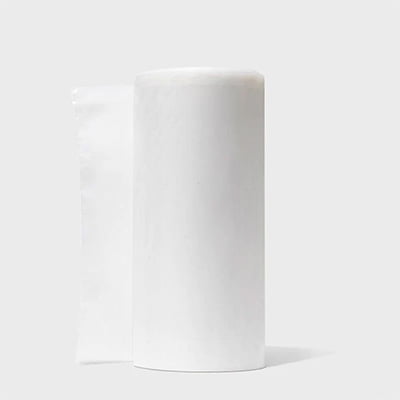
Source: Public Goods
Whether you're looking to reduce your carbon footprint or simply want to make a positive impact on the environment, Public Goods Biodegradable Garbage Bags are the perfect choice for managing your lawn and leaf waste in an eco-friendly way.
These 28-gallon bags are the perfect solution for managing your trash while also being kind to the environment. Made from 100% raw recycled materials that are biodegradable and will break down naturally in a landfill or composting facility within five years.
Not only are Public Goods Biodegradable Garbage Bags a sustainable choice for managing your household waste but they are also designed for durability and strength as conventional plastic bags.
Our Ratings
Overall Rating: 4.7/5 Durability: 4.5/5 Sturdiness: 4.6/5 Ease of Use: 4.5/5 Scent: 0/5 Leak Proof: 4.9/5
Materials | 100% recycled materials |
Capacity | 28 Gallons |
Pros:
Cons:
How We Picked
We take great pride in presenting our top picks for biodegradable trash bags. Our team of experts has spent countless hours scouring the market, sifting through customer feedback, and rigorously testing products to bring you only the best of the best. We understand that quality is paramount, which is why we've prioritized factors such as material composition, durability, leak-proof design, and ease of use to ensure that our recommendations meet the highest standards of performance and sustainability. You can trust that our curated selection will exceed your expectations and deliver a hassle-free, eco-friendly solution for managing your household waste.

